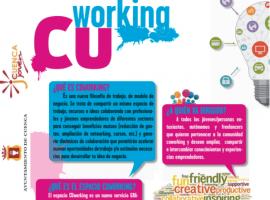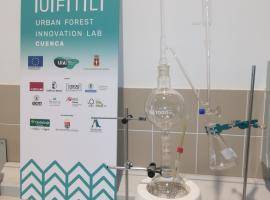All public buildings in the city of Cuenca and its province will be using (waste wood) biomass heating while other wood waste not suitable for pellets will be transformed into fuel (biogas). Private houses will have vertical gardens installed on modular, transportable panels able to regulate air humidity, water, sound and heat. For their vegetables, households will be using fertilisers and substrate derived from the composting of other secondary wood products …. 
Scouting innovators: how ideas shape the future of Cuenca's forest-based bioeconomy

The Urban Forest Innovation Lab (UFIL) is an initiative led by the Municipality of Cuenca that aims at developing a forest-based bioeconomy. In very simple terms, a forest-based bioeconomy uses forests in a friendly way in order to create sustainable materials, products and services. UFIL is one of the Urban Innovative Actions (UIA) which, in late 2018, was granted almost EUR 4 million support from the European Regional Development Fund to tackle this goal (see the project’s description). And the task is not trivial at all (see the implementation challenges faced by the project in Year 1).
There are not many similar initiatives across Europe, especially in Southern Europe. This is because forest economies are traditionally stronger in northern European countries where the production function of forests prevails. In addition, public authorities like municipalities and regions owning and/or managing forests are more inclined to have multi-functional forests (see chart below) that, besides wood, provide other goods and services which are not given a price and are not paid for. Not yet.

The future will be different. At the EU level, policymakers have recently defined a roadmap, the European Green Deal, which will bring us towards climate-neutrality in 2050 with the deployment of smart and sustainable systems. Bioeconomy and circular economy will then become common concepts, and reality on the ground. But while most of us contribute to this future with daily actions, work and curiosity (all necessary inputs) others lay the groundwork and explore new and disrupting possibilities. This is exactly the kind of people UFIL is looking for: individuals with ideas for the sustainable and innovative exploitation of forests and with sufficient entrepreneurship skills to put these ideas into practice.
UFIL is meant to nurture, tutor and further inspire these individuals in its innovation lab. The project’s innovation lab is a training campus hosted in the Institute of Technology of the University of Castilla-La Mancha, in Cuenca. UFIL foresees the carry out of three training sessions during its lifetime (2018-2021). Each session is planned to last 10 months and to have 35 participants. The first session was launched on 2 March 2020, following a selection process of participants which took place from October 2019 till January 2020. At the end of the process, a total of 114 candidatures were received but only 99 were supported by the necessary documentation. The project’s partners then made a ranking of these 99 eligible candidates against a set of three weighted criteria they had previously identified and agreed upon:
- The profile and experience of the candidate.
- The business idea the candidate plans to contribute with in the UFIL project.
- Other aspects such as personal motivation and added value in creating diversity within the final group of participants.
Finally, 36 individuals were selected and interviewed. Are they all potential innovators? Is it possible to scout innovators while going through a traditional selection method of candidates? We will need to wait for the end of the project and even further to get a reply to these questions.
In the meanwhile, we can start imagining the future of Cuenca and of its forests through the eyes of the candidates that were interviewed by the project’s team:
Souvenir shops in Cuenca will be the retailers of what is not transformed into pellets and is not burnt into biogas but is still found in the undergrowth of forests and is sufficiently structured to be shaped into unique objects. Pine cones, small tree trunks and stones will get a commercial value using design and brand……

The construction industry across Cuenca’s province will get eco-logs and eco-wood to build bio-villages, especially for tourists. Modular eco-wood houses and eco-furniture will be made available in kits ready for assembly. Design and brand will add value here as well. High tech wood panels and other wood-made structural elements will be produced as well as wood objects specifically aimed at replacing plastic-made materials, because sooner or later plastic will be banned ….

The forests of Cuenca will also provide resin, cellulose, aromatic and medical herbs/plants, mushrooms, space for apiculture and areas for livestock grazing. Secondary products will include tissue paper, textile fibre, packaging materials and resin-derived products. Weaving from wood will be used for bio-clothes and garments, and finally for developing a sustainable fashion. Many other opportunities for entrepreneurs will be in the delivery of services such as historic routes in forests, mushrooms parks, carbon sequestration, environmental education, and therapeutic services. Yes, because forests are also a natural recharger for the spirit of many people….

And finally drones will fly over Cuenca to monitor that the use of forests remains a friendly, sustainable one. And if any degraded or at-risk of degradation area is identified, drones will guide pollinators to initiate natural regeneration process. While a crypto currency will be at the core of an exchange economy of forest-based goods and services….

All these ideas put forward by the interviewees are great, regardless of their feasibility. Here, they have been freely collated with the aim of providing an overview of the creative potential. These ideas not only highlight the fact that Cuenca’s forests are a hidden treasure of goods and services but also that these individuals acknowledge the fact that forests may became a viable and innovative source of living for the community. This is exactly the attitude UFIL needs, because civil society’s awareness is as important as ideas in facilitating the project’s deployment of a forest-based bioeconomy. In addition, it is evident from the ideas of these young (and less young) fellows that the project is in the right place and that also relatively small cities deserve big opportunities.
On 17 March 2020, the residential course at the innovation lab had to be stopped because of COVID-19. Distance learning was started and is continuing up to now (end of May 2020). Business development ideas keep on flowing around, but through the web. A new challenge for UFIL that will need to continue innovating in the way it nurtures, tutors and inspires its future entrepreneurs.























